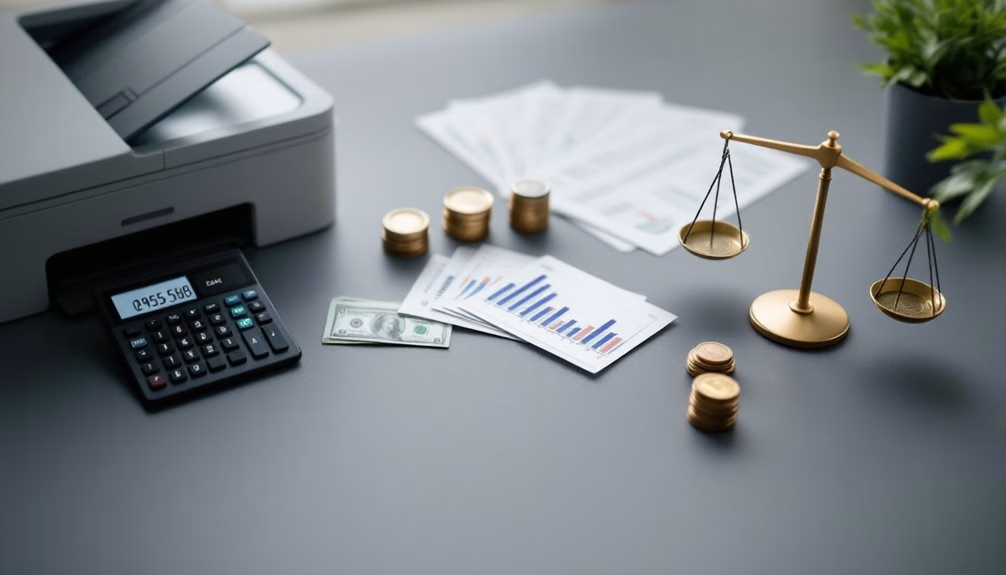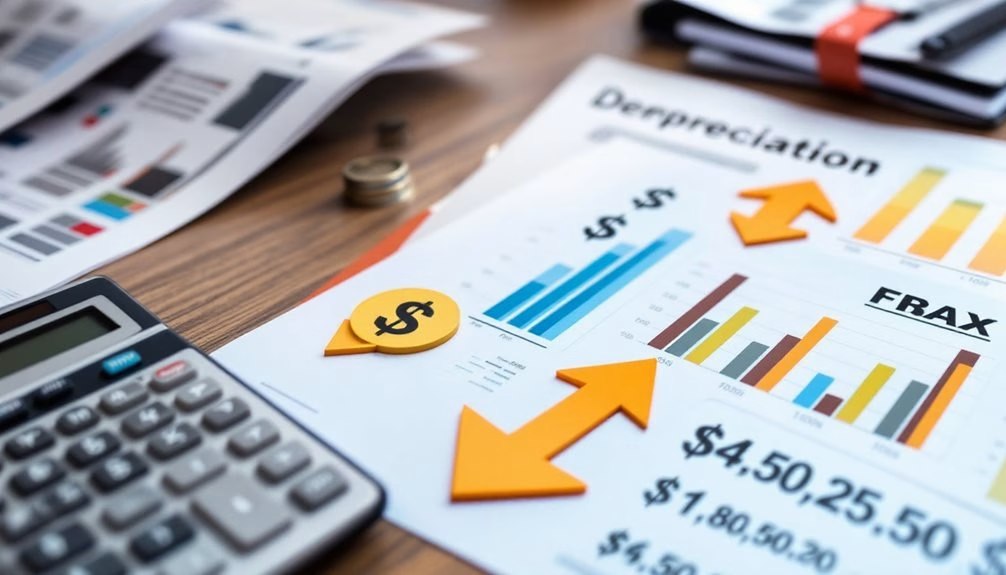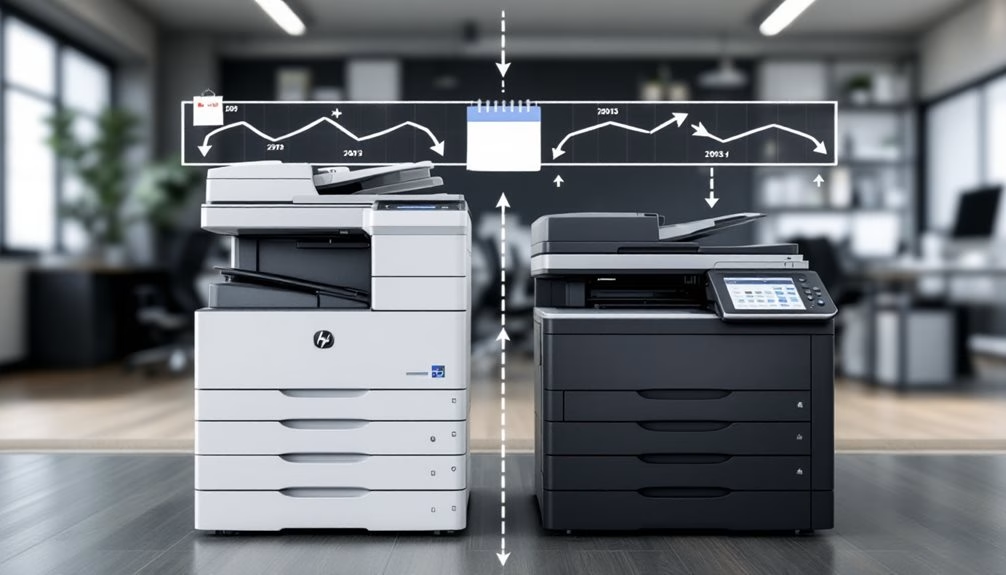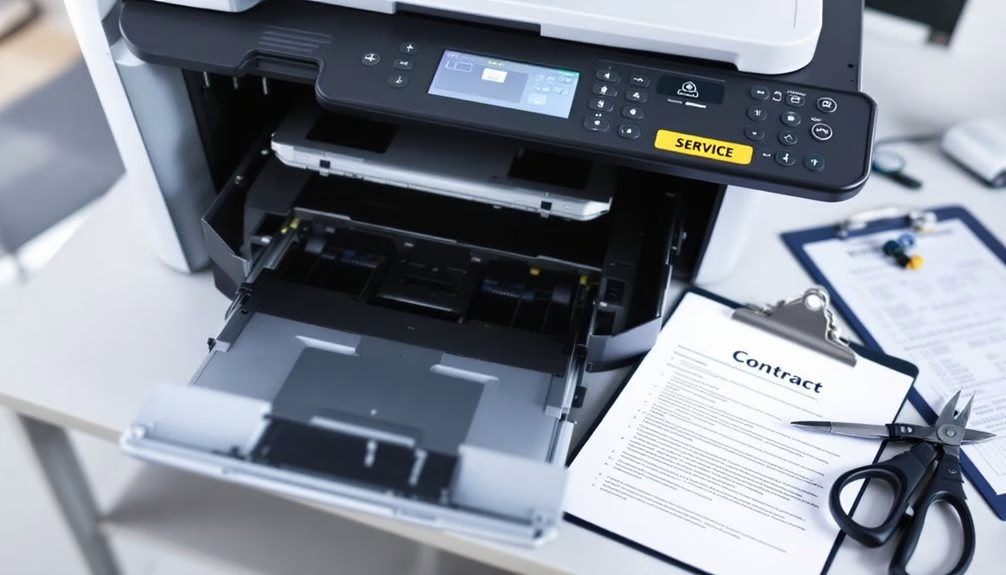We’re facing a critical decision when choosing between leasing or buying office copiers—one that impacts far more than just the equipment on your floor. While the upfront costs may draw your attention, the real financial story unfolds in the hidden expenses, tax implications, and technological considerations that shape your bottom line. Understanding these factors won’t just save money today but could transform your workflow efficiency for years to come.
Expert Highlights
- Total cost of ownership includes hidden factors that can double or triple the initial investment price.
- Leasing preserves capital with predictable monthly expenses while buying offers long-term savings after payoff.
- Tax considerations differ significantly, with purchasing providing depreciation benefits and leasing allowing expense deductions.
- Leasing protects against technology obsolescence by enabling regular equipment upgrades every 3-5 years.
- Maintenance responsibilities vary greatly, with leases typically including service agreements while ownership requires separate contracts.
Total Cost of Ownership: The Hidden Financial Impact

When evaluating copier acquisition options, five critical cost factors often remain hidden beneath the surface price tag.
Beyond the sticker price of copiers lurk five crucial cost factors that can dramatically impact your total investment.
We’ve discovered that businesses frequently overlook maintenance, supplies, energy consumption, downtime costs, and end-of-life disposal expenses.
These hidden elements can double or triple your initial investment over time.
We need to examine both leasing and purchasing through this thorough lens.
Leasing often bundles maintenance and supplies, creating predictable monthly expenses. Buying, while requiring upfront capital, may offer long-term savings for organizations with stable usage patterns.
Our flexible leasing options are specifically tailored to align with your budget constraints and operational requirements while minimizing upfront costs.
Let’s consider your unique workflow needs and cash flow situation before committing to either path.
Cash Flow Management: Short-Term vs. Long-Term Benefits

Managing your organization’s cash flow represents one of the most significant factors in the lease-versus-buy decision.
When we lease copiers, we’re preserving capital with lower initial costs and predictable monthly payments. This strategy works well for businesses needing to maintain liquidity.
Buying, however, offers long-term savings once the equipment is paid off. We’ve seen clients reduce total costs by 20-30% through ownership, despite the larger upfront investment.
Your decision should align with your financial priorities. Are you focused on conserving working capital today, or minimizing total expenditure over the equipment’s lifetime?
We’ll help you balance these competing considerations.
Our flexible financing options can be customized to accommodate various business needs while maintaining competitive rates.
Tax Implications and Depreciation Advantages

Tax implications greatly influence the lease versus buy decision, often tipping the scales for businesses with specific financial structures.
When we purchase a copier outright, we’re able to depreciate the asset over time, potentially claiming Section 179 deductions in the first year. This front-loaded tax benefit can greatly reduce our initial tax burden.
Leasing, however, allows us to deduct the entire payment as a business expense. We don’t own the asset, but we gain predictable monthly deductions that simplify our tax planning.
For companies with limited taxable income, this consistent approach may prove more advantageous than depreciation benefits.
The tax advantages of equipment leasing can be especially beneficial for companies looking to maintain financial flexibility while modernizing their office technology.
Technology Obsolescence and Upgrade Flexibility

Unlike fixed assets that maintain value over time, copier technology evolves rapidly, making obsolescence a critical factor in our decision-making process.
When we lease, we’re able to upgrade to newer models every 3-5 years, keeping pace with advancements in security, efficiency, and connectivity.
Purchasing locks us into today’s technology, which may become outdated before we’ve maximized our investment. We’ll find ourselves stuck with slower devices lacking newer features our teams need.
Technology quickly becomes yesterday’s news, locking you into outdated systems while competitors surge ahead with modern solutions.
Let’s consider how our workflow might evolve.
Leasing provides the flexibility to adapt to our changing document management needs without the burden of disposing of outdated equipment.
MFP leasing offers flexible leasing options that accommodate businesses of all sizes while avoiding technology obsolescence.
Maintenance Responsibilities and Service Level Agreements

Maintenance concerns represent a substantial difference between leasing and purchasing copiers. When we lease, maintenance is typically bundled into our agreement, while ownership means we’re responsible for arranging service solutions ourselves.
- Leases include extensive service agreements with guaranteed response times.
- Ownership requires separate maintenance contracts or pay-per-service arrangements.
- Most leases cover parts, labor, and supplies (except paper) in one monthly payment.
- Owned machines need budgeting for unexpected repair costs.
- Service level agreements (SLAs) in leases protect us from prolonged downtime.
We should evaluate these responsibilities carefully, as they greatly impact our total cost of operation and workplace productivity. Understanding your specific environment, whether it’s commercial business settings or home-based operations, will help determine which maintenance approach best suits your needs.
Frequently Asked Questions
How Does My Company’s Credit Rating Affect Leasing Approval?
Your credit rating considerably impacts our leasing approval process. We’ll offer better terms to businesses with higher scores, while lower ratings might mean higher rates or security deposits.
Can I Transfer a Lease Agreement When Relocating My Business?
Yes, we can usually transfer your lease agreement when relocating. Most providers offer this flexibility, but it’s worth checking your contract for any location restrictions or transfer fees.
What Happens to My Device at the End of Lease?
At the end of your lease, we’ll give you options: return the device, purchase it at fair market value, or upgrade to a newer model with a fresh agreement.
How Are Data Security Concerns Addressed When Returning Leased Copiers?
We’ll perform a complete data wipe before returning your leased copier, and provide certification of erasure. You’re always welcome to oversee the process—your data security is our priority too.
Are There Environmental Benefits to Leasing Over Buying?
Yes, leasing offers eco-benefits. We’re reducing waste since manufacturers refurbish and reuse copiers. We’re also ensuring proper disposal of hazardous materials and embracing newer, energy-efficient models more frequently.
Expert Final Thoughts
When evaluating copiers, we’ve found that lease vs. buy decisions greatly impact your bottom line. We’ve seen how proper analysis of total ownership costs, cash flow implications, tax benefits, technology upgrade paths, and maintenance responsibilities can save thousands. We recommend considering both your immediate financial situation and long-term business strategy before deciding which option best serves your unique operational needs.
About the Expert
Rafael M.
CEO of JR Copier
With over 35 years of hands-on experience in the copier and office printer industry, Rafael brings unparalleled expertise to every client interaction. His journey from service technician to CEO provides him with comprehensive understanding of all aspects of the business.
Areas of Expertise: Copier and printer sales, equipment leasing strategies, maintenance solutions, and managed print services. Rafael's deep industry knowledge ensures clients receive expert guidance, transparent pricing, and exceptional service for all their office equipment needs.
Connect on LinkedIn